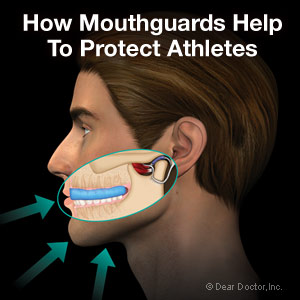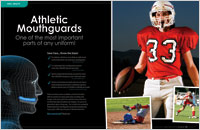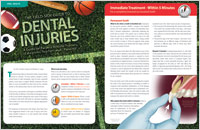Today most adults recognize that leading a healthy, active lifestyle is a big plus. Moderate exercise has been shown to help lower blood pressure, keep cholesterol levels under control, and even reduce feelings of anxiety or depression. Kids who take part in athletic activities — whether they're playing on organized sports teams, bicycling, or just kicking a ball around — gain a host of well-documented health benefits. Yet inevitably, along with all the fun, the sense of achievement, and the character-building features of athletics, the possibility of injury exists. Therefore, it makes sense to learn about the risks involved, and to take appropriate precautions.
How prevalent are sports-related dental injuries? In 2012, the National Youth Sports Safety Foundation forecast that more than 3 million teeth would be knocked out in youth sporting events that year! Among all the dental injuries we treat in children, it is estimated that over 25% are sports-related, and the majority of these involve the top front teeth.
Baseball, bicycling, handball, skiing, surfing and equestrian sports — plus some two dozen others — are activities that the American Dental Association (ADA) has identified as potential causes of dental injury in adults.
Don't get us wrong: There's no question that the benefits of physical activity far outweigh the possibility of being hurt. But when serious dental injury occurs, it can result in pain, time taken away from school and work, and high treatment costs — which often aren't covered by insurance. If you had a piece of equipment, endorsed by the ADA, which could reduce the risk of sports-related dental injury by 60 times… would you use it?
An Indispensable Part of Your Sports Gear

A high-quality, custom-made mouthguard should be part of every athlete's equipment. What's a mouthguard? It's a small protective device that fits over your teeth and absorbs the force of an impact, helping to protect the mouth from damage. There are different kinds of mouthguards, available from various sources. They include:
- "Off-the shelf" types. Found in some sports retailers and big-box stores, these inexpensive guards come in S-M-L sizes, and are generally worn by clenching them between the teeth. They are probably better than nothing, if you don't mind wearing them—but they can be uncomfortable, and are of uncertain quality.
- "Boil and bite" guards. This type of mouthguard is meant to be softened by heat, and then molded into shape by fingers, teeth and tongue. It's a better choice than the first kind, but there can be wide variation in how much mouth coverage these guards provide — and in their effectiveness.
- The custom-fabricated mouthguard. This is the one that's made just for you: First a model of your teeth is prepared, and then is individually fabricated into a piece of protective gear for a perfect fit. It's strong, lightweight and comfortable — which means you can wear it comfortably. Because, after all, if you don't wear it, it doesn't help.
Custom-made mouthguards are an indispensable piece of equipment — especially when they could save the inconvenience (and potentially much higher cost) of restoring or replacing teeth. So if you or your children are active in sports, consider having a custom mouthguard made by our office. It's the best way to prevent a dental injury from spoiling your game.
Related Articles

Athletic Mouthguards There are times when an athlete can feel invincible… able to connect on every jump-shot, run faster and longer, or hit every pitch, but statistics show that even on their best days accidents can happen. An ounce of prevention goes a long way… For a small cost, a protective mouthguard can prevent excess anxiety, risk, injury, pain, suffering, and years of dental treatment... Read Article

The Field-Side Guide to Dental Injuries Accidents to the teeth, jaws and mouth can happen at any time during any sporting activity. Proper attention can save pain, alleviate anxiety and costly dental treatment. A little knowledge, as they say, can go along way. This field-side guide briefly explains some simple rules to follow when dealing with different dental injuries and when you need to see the dentist... Read Article

An Introduction to Sports Injuries & Dentistry Dental injuries incurred during sports activities are highly treatable, and can involve positive outcomes if participants act quickly to see a dentist after an injury. However, if not treated quickly these kinds of injuries can lead to discomfort, embarrassment and a lifetime of dental costs... Read Article
